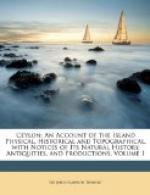[Footnote 1: The kaolin of Ceylon, according to an analysis in 1847, consists of—
Pure kaolin 70.0
Silica 26.0
Molybdena and iron oxide 4.0
____
100.0
In the Ming-she, or history of the Ming dynasty, A.D. 1368-1643, by Chan-ting-yuh, “pottery-stone” is; enumerated among the imports into China from Ceylon.—B. cccxxvi. p. 5.]
Nitre has long been known to exist in Ceylon, where the localities in which it occurs are similar to those in Brazil. In Saffragam alone there are upwards of sixty caverns known to the natives, from which it may be extracted, and others exist in various parts of the island, where the abundance of wood to assist in its lixiviation would render that process easy and profitable. Yet so sparingly has this been hitherto attempted, that even for purposes of refrigeration, crude saltpetre is still imported from India.[1]
[Footnote 1: The mineralogy of Ceylon has hitherto undergone no scientific scrutiny, nor have its mineral productions been arranged in any systematic and comprehensive catalogue. Specimens are to be found in abundance in the hands of native dealers; but from indifference or caution they express their inability to afford adequate information as to their locality, their geological position, or even to show with sufficient certainty that they belong to the island. Dr. Gygax, as the results of some years spent in exploring different districts previous to 1847, was enabled to furnish a list of but thirty-seven species, the site of which he had determined by personal inspection. These were:—
1. Rock crystal Abundant. 2. Iron quartz Saffragam. 3. Common quartz Abundant. 4. Amethyst Galle Back, Caltura. 5. Garnet Abundant. 6. Cinnamon stone Belligam. 7. Harmotome St. Lucia, Colombo. 8. Hornblende Abundant. 9. Hypersthene Ditto. 10. Common corundum Badulla. 11. Ruby Ditto and Saffragam. 12. Chrysoberyl Ratganga, North Saffragam. 13. Pleonaste Badulla. 14. Zircon Wallawey-ganga, Saffragam. 15. Mica Abundant. 16. Adular Patna Hills, North-east. 17. Common felspar Abundant. 18. Green felspar Kandy. 19. Albite Melly Matte. 20. Chlorite Kandy. 21. Pinite Patna Hills. 22. Black tourmaline Neuera-ellia. 23. Calespar Abundant. 24. Bitterspar Ditto. 25. Apatite Galle Back. 26. Fluorspar Ditto. 27. Chiastolite Mount Lavinia. 28. Iron pyrites Peradenia. 29. Magnetic iron pyrites Ditto, Rajawelle. 30. Brown iron ore Abundant. 31. Spathose iron ore Galle Back. 32. Manganese Saffragam.




